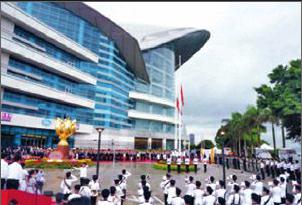‘One Country, Two Systems’And Many Nuances
2014-08-14

Peoples Daily, the official newspaper of the ruling Communist Party of China, has recently published a series of editorials marking the 17th anniversary of Hong Kongs return to China following more than a century of British rule. While reaffirming the pertinence of the “one country, two systems” policy, the editorials clarified the respective powers of the Central Government and the Government of the Hong Kong Special Administrative Region(HKSAR), and why patriotism is a prerequisite to good governance in Hong Kong. Following are some edited excerpts:
A cooperative relationship
In the past 17 years since Hong Kongs return to China, the territory has managed to remain prosperous and stable. This should be attributed to the joint safeguarding of the “one country, two systems” policy by the Central Government and the HKSAR. According to the Basic Law, Hong Kongs mini-Constitution, the HKSAR is an inalienable part of the Peoples Republic of China and is a special administrative region with a high degree of autonomy.
These regulations reveal that in such a unitary state as China, the Central Government possesses comprehensive jurisdiction over all local administrative regions including Hong Kong. This is a detailed expression of the principle of sovereignty, reflecting the Constitution-based responsibilities and obligations of a sovereign state. Based on the policy of “one country, two systems,” the Central Governments full jurisdiction over Hong Kong covers its direct exertion of authority as well as its authorization of the HKSARs high degree of autonomy, over which the Central Government exercises its supervisory power.
In accordance with Chinas Constitution and the Basic Law of the HKSAR, the central leaderships direct jurisdiction over Hong Kong is not restricted to the power of dealing with foreign and defense affairs that are usually the reflec- tion of sovereignty, but also includes the power of the establishment of the HKSAR; the power of formulation, amendment and interpretation of the Basic Law; the power of appointing the chief executive and major officials; the power of revising selection methods for the chief executive and the Legislative Council of the HKSAR, and supervising the laws adopted by the legislature; the power of decision on the HKSAR entering a state of emergency; and the power of making new authorizations for the HKSAR.
Meanwhile, as is prescribed by the Basic Law, the National Peoples Congress, Chinas top legislature, authorizes the HKSAR to exercise a high degree of autonomy as well as executive, legislative and independent judicial powers, including that of final adjudication. A lot of these powers are not enjoyed by regional administrative areas in the mainland. Some of its freedoms are greater than those enjoyed by states in federal republics, and some are only endemic to a sovereign country. The history and realities of Hong Kong have been taken into full consideration, and the Central Government fully trusts and respects Hong Kong. However, no matter how expansive Hong Kongs autonomy is, its legal status as a special administrative region in a unitary state remains unchanged. A high degree of freedom is not equal to absolute autonomy, and is by no means a fixed advantage for Hong Kong. It is merely an administrative power over regional affairs granted by the Central Government.endprint
Under the policy of “one country, two systems,” the central authorities overall jurisdiction does not contradict the HKSARs high degree of autonomy, and neither of the two can be omitted. The Central Government executes its power at the national level and does not interfere with affairs within the framework of this autonomy. The HKSAR, meanwhile, executes the administrative power of regional affairs. The two kinds of power cooperate with one another and work in accordance with the law, for the purpose of supporting the operation of the system of the HKSAR.
Some believe the less the Central Government interferes with Hong Kong, the better, and that it would be best if the Central Government completely gave up administration over Hong Kong. Others think the Central Governments sovereign powers over Hong Kong should be restricted only to foreign and defense affairs. Some even think that the overall jurisdiction is equal to a “takeover” of Hong Kong. These are misunderstandings of the relationship between the Central Government and the HKSAR, and thus go against regulations in the Constitution and the Basic Law.
Governance and loyalty
“Hong Kong people governing Hong Kong” is an integral maxim of the Central Governments basic policy for administering Hong Kong. From the proposal to the implementation of the “one country, two systems” policy, there have always been clear boundaries and criteria for this idea. That is, Hong Kong is to be administered by patriots.
As for the criterion of patriotism, late Chinese leader Deng Xiaoping pointed out on many occasions in the 1980s that patriots refer to those who respect their own nation, sincerely support Chinas resumption of the exercise of sovereignty over Hong Kong, and refrain from hurting Hong Kongs prosperity and stability. This standard clearly shows that to be loyal to the motherland is not the opposite of loving Hong Kong, but that these ideas coexist very well. The team governing the area, then, must be largely composed of local people who love both China and Hong Kong. The Basic Law requires that the chief executive, principal officials, members of the Executive Council, president and over 80 percent of the members of the Legislative Council, chief justice of the Court of Final Appeals and chief judge of the High Court must be Chinese citizens who are permanent residents of Hong Kong with no residency in any foreign country. When assuming office, these officials must, in accordance with the law, swear to uphold the Basic Law and pledge allegiance to the HKSAR of the Peoples Republic of China. This is the legalization of the criterion of loyalty. As for the mainstay that administers Hong Kong, this is the prerequisite for them to fulfill duties. Being patriotic is both a political and legal requirement.endprint
Some argue that to list judges and judicial staff among “those who administer Hong Kong” will harm judicial independence. Judicial right is a very important public power, which is also part of the political system of the HKSAR. Since the administrative power covers judicial right, why then cant judges and judicial staff in control of the power be included in Kong Hongs administrators?
Judicial independence means when dealing with specific cases, judges have the right to freely exercise jurisdiction in accordance with the law, not tethered by the interference of executive and legislative powers or other agencies. The Basic Law offers explicit legal guarantees for this. The court of the HKSAR conducts independent trials without interference. To list judges and judicial staff among “those who administer Hong Kong” will not affect the judicial independence of Hong Kong even a little, but instead, will strengthen judges and legal staffs sense of responsibility in executing duties in accordance with the Basic Law.
Put another way, demanding that a judge be a patriot will not erode judicial independence in Hong Kong. Judges in any country or region are required to be loyal to their country, and they have the responsibility to maintain the countrys sovereignty and security, with no exception to those in the HKSAR. Though it is stipulated in the Basic Law that judges and other judicial staff in the HKSAR may be employed from other regions with a common law system, when on the job, they must swear to uphold the Basic Law of the HKSAR. While dealing with legal cases, they have the obligation to safeguard Chinas unity and territorial integrity and Hong Kongs prosperity and stability. This does not conflict with judicial independence.
A consistent policy
The Chinese Government released a white paper, titled The Practice of the “One Country, Two Systems” Policy in the HKSAR, in June, providing a systematic explanation of the Central Governments principles and policies over Hong Kong. All the viewpoints mentioned there can be found in Chinas Constitution, the Basic Law of the HKSAR and the Central Governments Hong Kong policy documents. Some believe the white paper deviates from the basic principle and policy first put forward by the central leadership, while others worry that the Central Government will soon quell Hong Kongs high degree of autonomy. These concerns are groundless.endprint
In the 1980s, when the central leadership first proposed the basic policy toward Hong Kong, some expressed doubt over its future stability. In response, Deng pointed out that the policy of “one country, two systems” was not based on fleeting impulse, but on Hong Kongs history and realities. As Deng also pointed out, the policy would remain unchanged in the following 50 years after its 1997 return to China. This solemn commitment was made not only to quash the fears of Hong Kong residents, but also to keep close ties between Hong Kongs prosperity and the development of the whole country. To keep the HKSAR successful and stable conforms to the whole countrys interests. Later, this commitment was written into the Basic Law, explicitly stipulating in Chapter One: “The socialist system and policies shall not be practiced in the HKSAR, and the previous capitalist system and way of life shall remain unchanged for 50 years.”
Since its Hong Kongs return to the motherland, the Central Government has stuck to the“one country, two systems” and “Hong Kong people administering Hong Kong” policies, and bestowed an ample autonomy on the area while strictly abiding by the Basic Law. Chinas successive central leaderships have made a series of elaborations on the “one country, two systems” policy consistent with Dengs explanation. Not only has Hong Kong managed to maintain its previous capitalist system and way of life and safeguard its status as an international finance, trade and shipping center, but it has also made new progress and achievements in its democratic system, economic growth, and various social causes.
Hong Kong will continue to play the role of a “window to the world” to attract foreign capital and talent in addition to advanced international technologies, managerial experience, and more. Thus far, the Central Governments practices have proven that China is fulfilling its commitment, staying true and consistent to its basic policy toward Hong Kong.endprint
